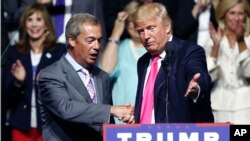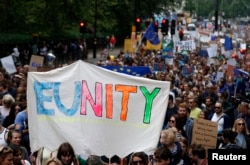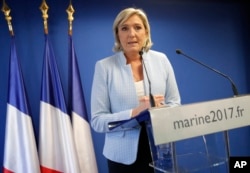Britain's vote to leave the European Union was a major shock to the global political system. But in a year of political earthquakes, it has just been trumped.
Like Brexit, Donald Trump's victory over Hillary Clinton in the U.S. presidential election was driven by voters turning against the established order and mainstream politicians. Years of uncertainty after the 2008 global financial crisis left some of those voters economically vulnerable, while others were unsettled by terrorism, global instability and the many people fleeing war and poverty.
It all bred a sense of revolt — that there would be no more of the same old, same old.
Steven Fielding, director of the Center for British Politics at the University of Nottingham, likened the mood to the 1970s film "Network," in which a TV anchor lets out a famous cry of frustration.
"'I'm mad as hell and I'm not going to take it anymore' — it's kind of like that," Fielding said.
The same populist wave could soon roll over Italy, France and beyond.
Trump's win came as a shock to many, but quite a few watching from Britain felt a strong sense of deja vu.
First came the groundswell of support for figures like pro-Brexit British politician Nigel Farage and Trump, and ideas long-considered on the fringe: leaving the EU, or building a wall on the U.S.-Mexican border. There were pithy anti-establishment slogans: Britons were urged to "Take back control," while U.S. voters were told to "Make America great again."
Details on how to execute such change were often scant. But it didn't matter.
Some resented immigrants or people from different races and backgrounds, and found campaigns that spoke to their anxiety.
In both cases, many commentators refused to believe the challenger could win. Pollsters were fooled. Bookies paid dearly for failing to predict the outcome.
Farage and Trump see themselves as allies on similar missions. The president-elect has likened his campaign to an American Brexit. Farage said Wednesday that 2016 will be "the year of two great political revolutions."
"I thought Brexit was big, but boy, this looks like it's going to be even bigger," he said.
Voters' reasons for embracing Trump, as for Brexit, were complex.
Many parents feared they would leave their children less well-off — unable to buy a house or fund a pension. That was coupled with anxiety about a world changing more quickly than anyone had imagined.
Americans were voting against Washington, just as Britons had voted against the entrenched forces of government in London.
Pollsters and the mainstream media did not hear their voices, said University of Kent political scientist Matthew Goodwin, an expert on the populist right.
"Many commentators in the United States dismissed the Brexit comparison, arguing that Hillary Clinton was in a far stronger position," he said.
But they underestimated the determination "among mainly white, working class and less well-educated Americans who feel under threat from rampant globalization and increasing rates of ethnic and cultural change."
Trump is unlikely to be the last populist to win. Under threat soon is Italian Prime Minister Matteo Renzi, whose government will be shaken if he loses a Dec. 4 referendum on constitutional reform. A loss boosts the anti-EU Five Star movement.
France, Germany and the Netherlands all face elections in 2017. Among the first to congratulate Trump were heads of the nationalist Alternative for Germany, which is expected to take a double-digit share of the vote, and French National Front leader Marine Le Pen. Her far-right party is predicted to do well among voters frustrated with the status quo, economic stagnation and France's shrinking global clout.
Le Pen, a candidate for president, said the U.S. result "buries the old order," as did Brexit.
"What happened overnight in the United States is not the end of the world but the end of a world," Le Pen said.
In the Netherlands, which votes in March, far-right Freedom Party leader Geert Wilders said Trump's win signaled, "Look, it is possible!"
"What the Americans can do, we can, too," he said.
Analysts warn that the hope and anger harnessed by populists are a volatile force, and that outsiders find it far easier to make promises than to deliver on them.
"It's all very well saying no and rejecting something, but to put something in its place is a very complicated process," Fielding said. "We may be entering a period of great anger."






